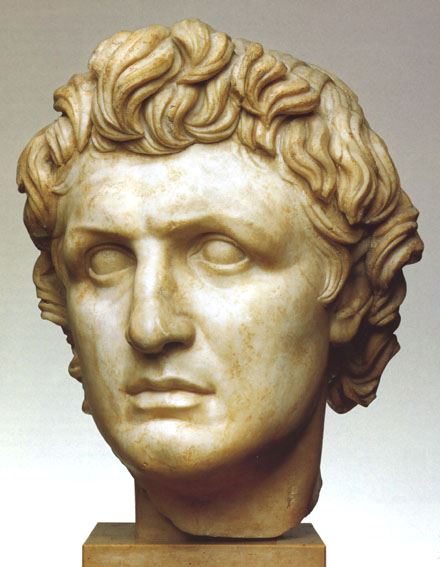Attalus I ruled Pergamon, an Ionian Greek polis, first as dynast, later as king, from 241 BC to 197 BC. He was the first cousin once removed and the adoptive son of Eumenes I, whom he succeeded, and was the first of the Attalid dynasty to assume the title of king in 238 BC.
Attalus won an important victory over the Galatians, newly arrived Celtic tribes from Thrace, who had been, for more than a generation, plundering and exacting tribute throughout most of Asia Minor without any serious check. This victory, celebrated by the triumphal monument at Pergamon (famous for its Dying Gaul) and the liberation from the Gallic "terror" which it represented, earned for Attalus the name of "Soter", and the title of "king". A courageous and capable general and loyal ally of Rome, he played a significant role in the first and second Macedonian Wars, waged against Philip V of Macedon.
During his reign he established Pergamon as a considerable power in the Greek East. He died in 197 BC, shortly before the end of the second war, at the age of 72, having suffered an apparent stroke while addressing a Boeotian war council some months before. He and his wife were admired for their rearing of their four sons. He was succeeded as king by his son Eumenes II.
Attalus won an important victory over the Galatians, newly arrived Celtic tribes from Thrace, who had been, for more than a generation, plundering and exacting tribute throughout most of Asia Minor without any serious check. This victory, celebrated by the triumphal monument at Pergamon (famous for its Dying Gaul) and the liberation from the Gallic "terror" which it represented, earned for Attalus the name of "Soter", and the title of "king". A courageous and capable general and loyal ally of Rome, he played a significant role in the first and second Macedonian Wars, waged against Philip V of Macedon.
During his reign he established Pergamon as a considerable power in the Greek East. He died in 197 BC, shortly before the end of the second war, at the age of 72, having suffered an apparent stroke while addressing a Boeotian war council some months before. He and his wife were admired for their rearing of their four sons. He was succeeded as king by his son Eumenes II.

Epithet: Soter ("the Savior")
No coins matching the search term(s)
